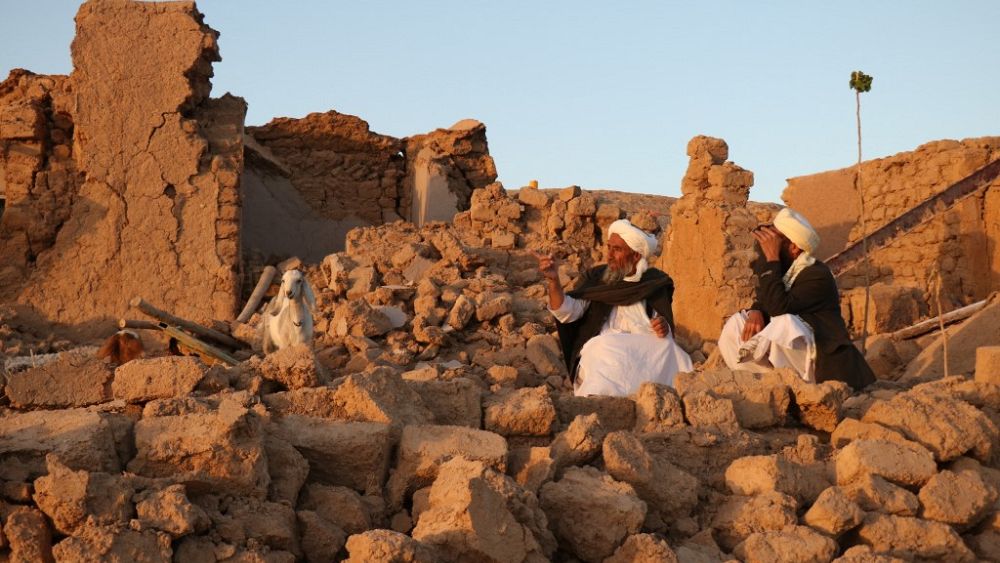
The figures couldn’t be independently verified, but if correct, the toll would eclipse that of an earthquake that hit eastern Afghanistan in June 2022, striking a rugged, mountainous region, flattening stone and mud-brick homes and killing at least 1,000 people.
People have attempted to dig out the dead and injured with their hands in Herat, clambering over rocks and debris. Survivors and victims were trapped under buildings that had crumbled to the ground, their faces grey with dust.
One video, shared online, shows people freeing a baby girl from a collapsed building after being buried up to her neck in debris. A hand is seen cradling the baby’s torso as rescuers ease the child out of the ground. Rescuers said it was the baby’s mother. It is not clear if the mother survived.
Abdul Wahid Rayan, a spokesman at the Ministry of Information and Culture, said Sunday the death toll is higher than originally reported. Villages have been destroyed, and hundreds of civilians are buried under the debris, he said while calling for urgent help.
“Besides the 2,060 dead, 1,240 people are injured and 1,320 houses are completely destroyed,” said Rayan.
Saturday’s magnitude 6.3 earthquake, near Afghanistan’s fourth-largest city, Herat, was followed by strong aftershocks.
The US Geological Survey said the quake’s epicentre was about 40 kilometres northwest of Herat city. It was followed by three very strong aftershocks, measuring magnitude 6.3, 5.9 and 5.5, as well as lesser shocks.
Aid and rescue effort
At least a dozen teams have been scrambled to help with rescue efforts, including from the military and non-profit organisations like the Red Crescent.
The United Nations migration agency deployed four ambulances with doctors and psychosocial support counsellors to the regional hospital. At least three mobile health teams were on their way to the Zenda Jan district, which is one of the worst-ht areas.
Doctors Without Borders set up five medical tents at Herat Regional Hospital to accommodate up to 80 patients. Authorities have treated more than 300 patients, according to the agency. UNICEF dispatched thousands of supplies, including winter clothes, blankets and tarpaulins as temperatures dropped.
Irfanullah Sharafzai, a spokesman for the Afghan Red Crescent Society, said seven teams were busy with rescue efforts while others were arriving from eight nearby provinces. They set up a temporary camp for the displaced, Sharafzai said.
Teams from the aid group described the destruction near Herat as much worse than initially feared, with entire villages flattened.
Photographer Omid Haqjoo visited four villages in the Zenda Jan district on Sunday morning. He reported seeing bodies under collapsed houses and locals waiting for help, lacking shovels to dig out bodies. Some aid groups, like the World Food Programme, were already on the scene with essential items.
Later on Sunday, people from surrounding villages brought equipment to support rescue efforts.
The first quake was the strongest, causing the most damage and casualties, Haqjoo said, quoting survivors.
“Most people were shocked … some couldn’t even talk. But there were others who couldn’t stop crying and shouting,” he told The Associated Press by phone from Herat.
Save the Children said the scale of the damage was horrific. “The numbers affected by this tragedy are truly disturbing, and those numbers will rise as people are still trapped in the rubble of their homes in Herat,” said the aid group’s country director for Afghanistan, Arshad Malik. “This is a crisis on top of a crisis. Even before this disaster, children were suffering from a devastating lack of food.”
He called for an “urgent injection” of money from the international community.
Neighbouring Pakistan said it was in contact with Afghan authorities to get an assessment of the urgent needs.
China’s ambassador to Afghanistan, Zhao Xing, said his government and the country’s charitable institutions were ready to provide all kinds of help. “We are in contact with Afghan government aid agencies to provide aid to the needy,” he said on X, formerly known as Twitter.
Afghan cricket star Rashid Khan is donating all his Cricket World Cup fees to help Herat’s earthquake survivors. “Soon, we will be launching a fundraising campaign to call upon those who can support the people in need,” he told his 1.9 million followers on X.
Japan’s ambassador to Afghanistan, Takashi Okada, expressed his condolences on the social media platform X, saying he was “deeply grieved and saddened to learn the news of the earthquake in Herat province.”
Telephone connections remain unstable in Herat after the disaster, making it hard to get details from affected areas.





